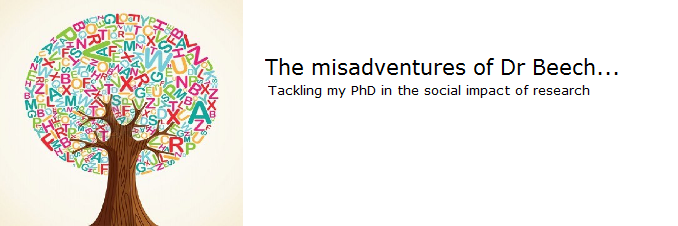 One of the trials of choosing a very new topic for your PhD, is that you sometimes have a hard time convincing people it is worth doing. So far, I have been very lucky in this respect, and all my colleagues have been supportive and encouraging, and have agreed that studying methods of social impact and forming recommendations is indeed a worthwhile pursuit.
One of the trials of choosing a very new topic for your PhD, is that you sometimes have a hard time convincing people it is worth doing. So far, I have been very lucky in this respect, and all my colleagues have been supportive and encouraging, and have agreed that studying methods of social impact and forming recommendations is indeed a worthwhile pursuit.
However, I am still guilty of that pesky troublesome imposter syndrome from time to time, and so have today been thinking about how, when faced with Mr/Mrs Doubty McGee, I can defend the efficacy of my topic. I see this as falling into two sections:
- What effect/changes will my research have/create on academia/practice?
- Why is it important these changes happen?
So, number 1: What effect/changes will my research have/create on academia/practice?
By testing out different methods and tools for dissemination and promotion of academic research, I will be producing tailored recommendations that and case studies that relate to researchers in their field. I hope that this would provide some guidance and structure to dissemination activities, helping researchers to make informed decisions about the platforms and tools they use.
With so many tools at our disposal, it is easy and understandable to get overwhelmed by the amount of choice, and to end up choosing methods that don’t suit our purposes. As well as helping people to make these choices, my research will also explore how we can measure the success of the tools/platforms/methods we use. I believe that, when people can see clear evidence of the ROI they get for their time and energy, they are much more likely to engage with that process.
Hopefully, I make a compelling argument so far……but what about why it is important that these changes happen?
For me, a lot of it comes down to changes in the way that academic excellence is assessed. In the current Research Excellence Framework (REF2014), Impact, or reach and significance, accounts for 20% of the assessment. Whatever people’s views on how much they agree with this decision, the facts remains that decisions made about research funding are being significantly influenced by the assessors perception of how much of an impact the research has had.
Having recently attended a HEFCE consultation on Open Access, and Impact, it is clear that for future REF assessments, this emphasis on impact is only going to increase. With this in mind, I think it is key that researchers are able to make decisions around the dissemination of their work in order to maximize their impact.
The other side to this question, was demonstrated well by Jane Tinkler, London School of Economics, at the Westminster Forum for Higher Education on the Social Impact of Academic Research. Jane pointed out that it is of real importance that we ‘professionalize the support around researchers’ for social media and dissemination activities. I agree that, to ensure this support and guidance is of a high, consistent caliber, we need to make sure it has a solid, scientific, academic background that can be used to demonstrate that the methods used and decisions made are robust and effective.
I would be interested to hear what people think to these arguments, and if there is anything you think I have missed/could add?
